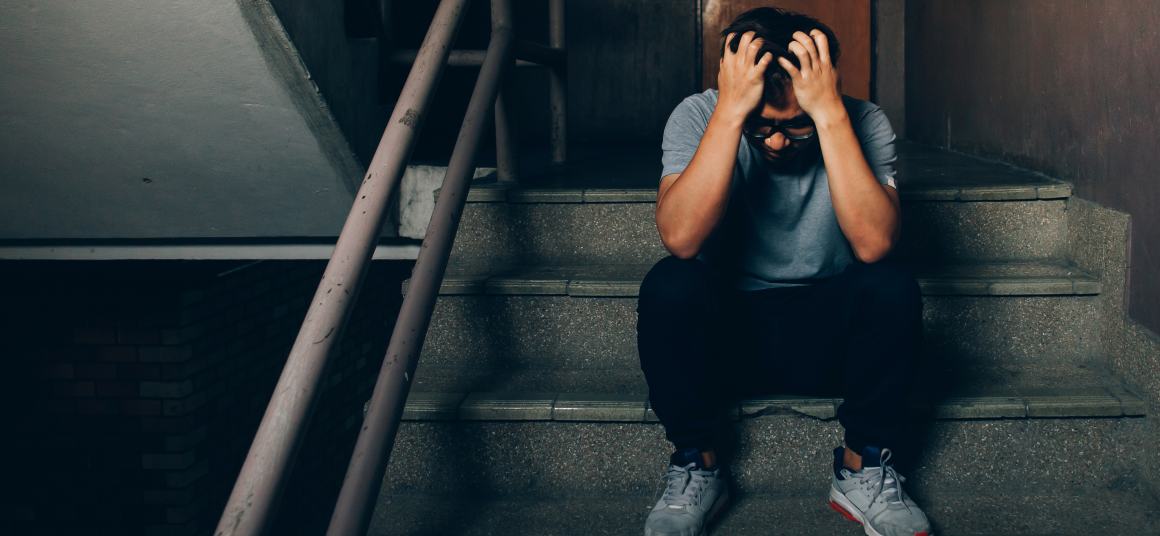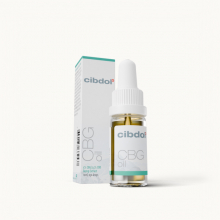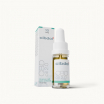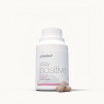Which is Better for Depression: CBD or CBG?
Published:
Depression is one of the most prevalent mental health issues facing the world today. While antidepressant medications are commonly used, many seek natural alternatives to support mood and reduce depressive symptoms. Two promising options are the cannabis-derived compounds CBD and CBG. But when it comes to depression, which one is better? Here’s an in-depth look at the evidence.
Contents:
- What is Depression?
- CBD vs CBG: How Are They Similar?
- CBD for Depression
- CBG for Depression
- CBD vs. CBG for Depression: Key Differences
- Which is More Effective: CBD or CBG?
- How to Choose Between CBD and CBG
- Using CBD and CBG Safely and Effectively
- Which Should You Choose: CBD or CBG?
- CBD vs. CBG for Depression
- Frequently Asked Questions
- Which is better for depression CBD or CBG? Conclusion
- Resources used to write this article

What is Depression?
Depression, also called major depressive disorder or clinical depression, is a mood disorder characterized by persistent feelings of sadness, lost interest in activities, and other debilitating symptoms. It can occur for a variety of complex reasons involving brain chemistry, hormones, genetics, and environmental stressors.
People with depression experience disturbances in neurotransmitters like serotonin, dopamine, and noradrenaline which regulate mood. Common symptoms include:
- Depressed, sad mood
- Loss of pleasure/interest
- Changes in appetite and sleep
- Fatigue, lack of energy
- Difficulty concentrating
- Feelings of guilt and worthlessness
- Thoughts of death or suicide
Depression significantly impacts people’s quality of life and ability to function. Treatment typically involves psychotherapy, medications, lifestyle changes, or often a combination.
CBD vs CBG: How Are They Similar?
CBD (cannabidiol) and CBG (cannabigerol) share some key similarities:
- They are both non-intoxicating cannabinoids derived from cannabis plants.
- Neither produces a euphoric high like THC.
- Both interact with the human endocannabinoid system.
- Early research shows promising effects for mood regulation.
- Appear to have good safety and tolerability profiles.
- Available in various formulations from oils to edibles.
However, CBD and CBG have different chemical structures and interact with the body and brain through distinct mechanisms. This leads to differences in their therapeutic effects.
CBD for Depression
CBD has become popular for its research-backed benefits for various conditions. How does it fare specifically for depression?
Preclinical evidence:
- Reduces depressive behaviors in rodent studies
- Shows antidepressant effects comparable to SSRIs
- Normalizes stress-related disturbances in serotonin signaling
Human evidence:
- Small clinical trials show significant improvements in depressive symptoms
- Improves mood and sleep quality in anxiety disorders -safe and well tolerated in most studies
While promising, there are still few large scale human CBD depression studies. And optimal dosing regimens need to be clarified. But current evidence indicates CBD holds potential for helping manage depression.
CBG for Depression
Less research has focused specifically on using CBG for depression. But early results are also encouraging:
Preclinical evidence:
- Shows significant antidepressant effects in rodent depression models
- Normalizes deficits in serotonin signaling caused by chronic stress
- May enhance extracellular dopamine levels
Human evidence:
- Improves emotional processing and reduces anxiety in small studies
- Anxiolytic effects demonstrated in human pilot trials
- Reported to enhance mood and reduce stress in consumer surveys
Again, larger scale clinical trials are still needed. But the antidepressant mechanisms shown in lab studies merit further human research into CBG for depression.
CBD vs. CBG for Depression: Key Differences
Based on the current evidence, what seem to be the key differences between using CBD vs. CBG for depression?
Onset and duration: Anecdotal reports suggest CBG provides faster relief while CBD’s effects seem to last longer. CBG may work within 30-60 minutes while CBD can take 1-2 hours to notice benefits.
Serotonin activity: Both CBD and CBG positively modulate serotonin receptors. However, CBG appears to have greater activity at 5-HT1A receptors specifically implicated in depression and anxiety disorders.
Stimulating effects: CBG seems to have mildly stimulating properties, while CBD does not generally provide an energizing effect. Those with depression and fatigue may favor CBG for this reason.
Entourage effect: While both work alone, CBD shows more synergy with other cannabis components like THC when combined for a greater total effect.
So while there are certainly differences, both CBD and CBG demonstrate therapeutic mechanisms that translate to noticeable improvements in mood for many seeking relief from depression symptoms.
Which is More Effective: CBD or CBG?
Currently there are no major clinical studies directly comparing CBD and CBG head-to-head for treating depression. However, some preclinical research provides clues:
Rodent study findings:
- Both CBD and CBG reduced depressive behaviors vs. control
- CBG showed slightly more potent antidepressant effects
- The combination of CBG and CBD worked better than either alone
Anxiety study in humans:
- Single doses of CBG reduced anxiety significantly more than CBD
- Hints at CBG’s superior potential antidepressant effects
Consumer surveys:
- Most report mood benefits from both CBD and CBG use
- More describe CBG as optimizing mood, while CBD calms
- Higher satisfaction reported from combining CBD and CBG
Clearly more large scale comparative research is warranted. But based on limited current evidence, CBG appears moderately more effective for beneficially influencing mood states like depression. The best solution may be a balanced combination of CBD and CBG based on individual needs.
How to Choose Between CBD and CBG
So when considering CBD or CBG for depression relief, here are some factors to help choose what’s right for your needs:
- Symptoms – If lacking energy and motivation, CBG may provide more stimulation. For anxiety, CBD may have more relaxing effects.
- Onset – Choose CBG for faster relief, or CBD for longer duration.
- Source – High quality European CBD vs. American CBG provides different chemical profiles.
- Route - CBG works faster when vaped; CBD is optimal sublingually.
- Dose – Try combining smaller amounts of both to harness potential entourage benefits.
- Lifestyle – Factor in timing and onset differences. CBG for daytime or social situations, CBD for evening relaxation.
The key is finding the right balance of cannabinoid synergy tailored to your unique depression symptoms and lifestyle needs. Tracking the subtle differences will help you optimize results.
Using CBD and CBG Safely and Effectively
If you decide to try CBD, CBG, or both for depression, here are some tips for safe, responsible use:
- Talk to your doctor – Discuss using CBD or CBG if you take any medications or have health conditions.
- Start low and go slow – Gradually increase doses of CBD, CBG or both to find your sweet spot.
- Track your results – Note symptom changes and side effects to tailor your perfect protocol.
- Buy from reputable brands – Ensure your CBD or CBG products are high quality from legal, compliant sellers.
- Watch for drug interactions – CBD and CBG may interact with certain common medications like antidepressants.
- Don’t stop other treatments – Use CBD or CBG as a supplement, not a replacement, for medical therapies.
Using CBD or CBG with care under medical guidance may help provide natural relief as part of a depression treatment plan. But work closely with your doctor and never discontinue prescribed medications without oversight.
Which Should You Choose: CBD or CBG?
Based on the totality of evidence so far, CBG appears to offer modest advantages over CBD specifically for alleviating depressive symptoms:
- Stronger antidepressant mechanisms
- Faster onset of noticeable effects
- Mildly stimulating properties to counter fatigue
- Potentially greater potency at common doses
However, CBD still demonstrates substantial mood-regulating properties. And it provides longer lasting action with more relaxation. The ideal approach may be a thoughtful combination of both cannabinoids tailored to each individual.
Until more large-scale head-to-head studies emerge, there is promising potential in both CBD and CBG for providing natural relief for those struggling with depression. Tracking your personalized response to each cannabinoid can help discover the right regimen for optimizing mood.
CBD vs. CBG for Depression
- Both CBD and CBG influence neurotransmitters and neural pathways involved in modulating mood and emotions.
- Research shows encouraging antidepressant properties for both cannabinoids.
- CBG may offer more stimulation with faster onset, while CBD provides longer relaxation.
- Current limited evidence implies CBG may be slightly more potent for beneficially impacting depression.
- Combining both CBD and CBG may produce optimal entourage effects.
- Work closely with your doctor and track your own experience to determine what works best for your needs.
- Further large-scale comparative research is warranted to clarify the therapeutic potentials of CBD and CBG.
Continued study of these promising non-intoxicating plant compounds may offer more natural treatment options for those seeking relief from depression’s debilitating effects.
Frequently Asked Questions
How much CBD or CBG should I take for depression?
There are no official guidelines for CBD or CBG dosing for depression yet. Experts recommend starting with 1-6mg per 10 pounds of body weight and increasing slowly as needed and tolerated. It's important to track your individual response.
How long does it take for CBD or CBG to work for depression?
Most people notice subtle CBD effects within 1-2 hours, with peak benefits at 2-4 hours. CBG may work more rapidly, with initial effects felt within 30-90 minutes. Full mood benefits can take weeks with regular use.
Can I take CBD and CBG together for depression?
Yes, early research shows taking CBD and CBG together works better than either alone. Start with lower doses of each and adjust ratios over time. Aim for possible "entourage" effects. Discuss mixing with your doctor.
Will my depression go away with CBD or CBG?
CBD and CBG should not replace professional mental health treatment. While they may help manage symptoms, CBD and CBG are not cure-alls and depression often requires comprehensive treatment. Work with your healthcare provider.
Are there side effects to CBD or CBG?
Both are considered generally safe and well-tolerated, but potential side effects can include diarrhea, fatigue, appetite changes, and interactions with certain medications. Talk to your doctor about any side effects.
Which is better for depression CBD or CBG? Conclusion
Emerging research suggests both CBD and CBG hold promise for helping those suffering from depression by positively modulating mood-regulating mechanisms in the brain and body. Subtle differences in therapeutic action give each cannabinoid their own advantages. While current evidence implies CBG may confer modestly greater relief from depressive symptoms, combining both CBG and CBD may provide the ideal entourage effect based on your needs. Further rigorous comparative study will better clarify the therapeutic potentials of these two non-intoxicating cannabinoids for managing depression.
Resources used to write this article
For the sections explaining CBD and CBG:
- Overviews of CBD and CBG: https://www.ncbi.nlm.nih.gov/pmc/articles/PMC7241529/ and https://www.ncbi.nlm.nih.gov/pmc/articles/PMC6473842/
- Safety and side effect profiles: https://www.ncbi.nlm.nih.gov/pmc/articles/PMC5569602/ and https://www.ncbi.nlm.nih.gov/pmc/articles/PMC7428512/
For the CBD and depression section:
- Preclinical evidence: https://www.ncbi.nlm.nih.gov/pmc/articles/PMC5239338/
- Human trials: https://www.ncbi.nlm.nih.gov/pmc/articles/PMC5958190/
For the CBG and depression section:
- Preclinical studies: https://www.ncbi.nlm.nih.gov/pmc/articles/PMC8513372/
- Human evidence: https://www.ncbi.nlm.nih.gov/pmc/articles/PMC7428512/
For the comparison section:
- Rodent study: https://www.mdpi.com/1467-3045/44/3/73
- Human anxiety study: https://www.ncbi.nlm.nih.gov/pmc/articles/PMC7428512/
- Consumer survey data: https://www.ncbi.nlm.nih.gov/pmc/articles/PMC8320196/


















